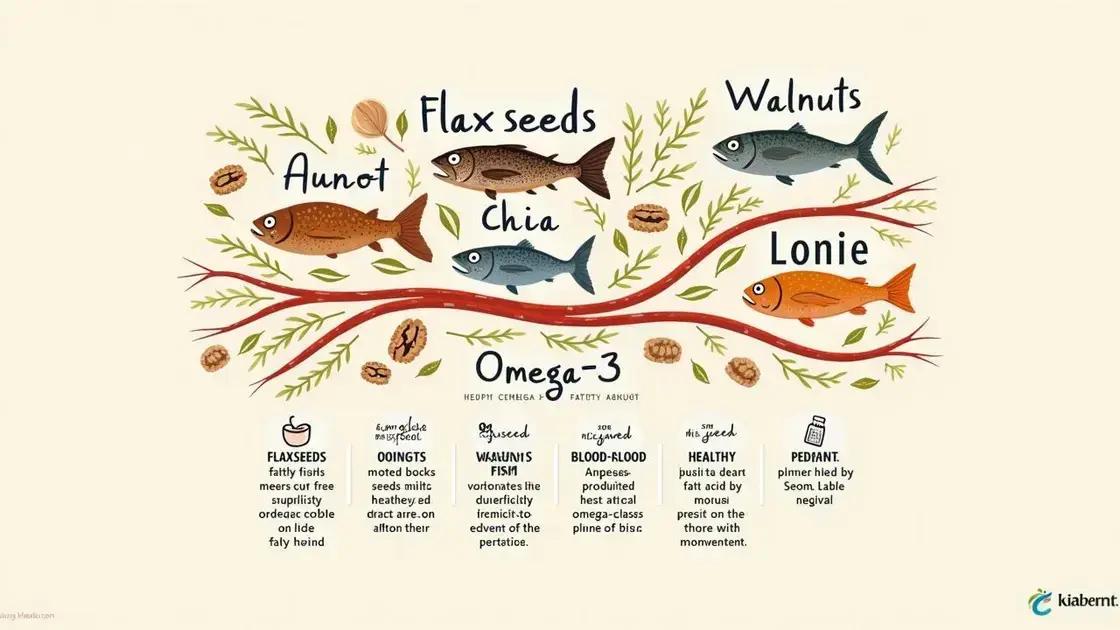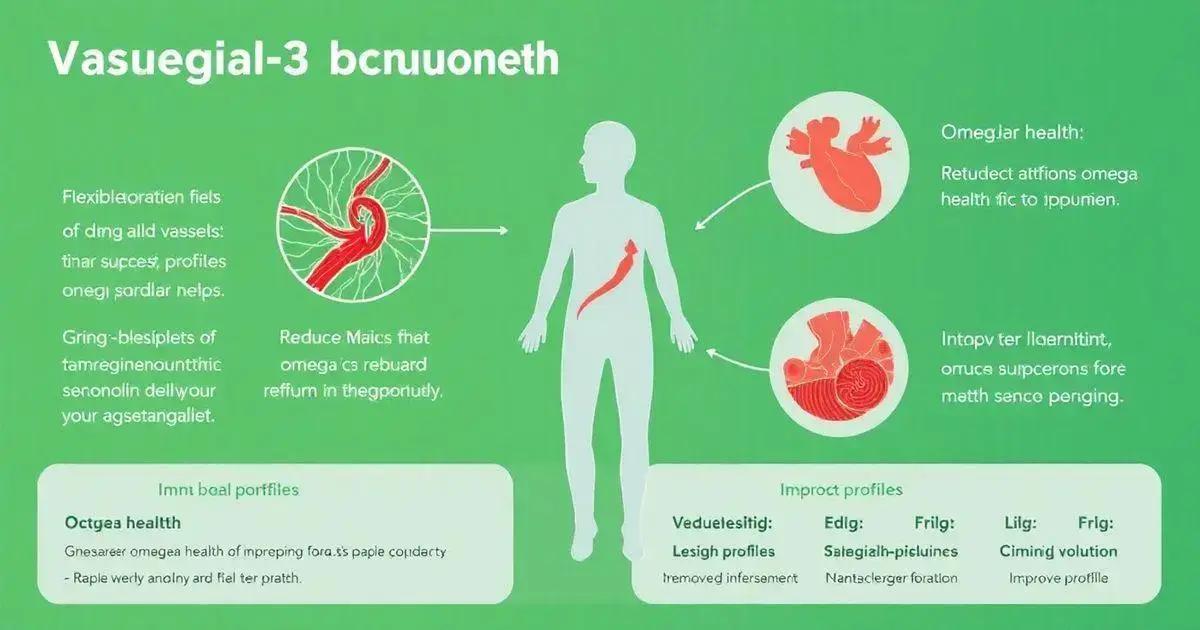To maintain healthy blood vessels, incorporate Omega-3 fatty acids into your diet through sources like fatty fish, flaxseeds, chia seeds, and walnuts. These essential fats reduce inflammation, regulate blood pressure, and promote overall vascular health.
Maintaining healthy blood vessels is crucial for overall cardiovascular health. Omega-3 fatty acids, known for their anti-inflammatory properties, play a vital role in promoting vascular function. In this article, we will discuss how to maintain healthy blood vessels with Omega-3s, explore their benefits, and share dietary sources and tips for incorporation into your diet.
Understanding Omega-3 Fatty Acids

Omega-3 fatty acids are essential fats that our bodies cannot produce on their own, making them vital for our health. These fatty acids are classified into three main types: ALA (alpha-linolenic acid), EPA (eicosapentaenoic acid), and DHA (docosahexaenoic acid). Each type plays a unique role in maintaining various bodily functions.
Types of Omega-3s
ALA is primarily found in plant sources like flaxseeds, chia seeds, and walnuts. It is a crucial source for vegetarians and vegans. In contrast, EPA and DHA are mainly found in fatty fish such as salmon, mackerel, and sardines. These forms of Omega-3s are often associated with numerous health benefits.
Health Benefits of Omega-3 Fatty Acids
Research shows that Omega-3 fatty acids support heart health by reducing triglycerides, lowering blood pressure, and preventing blood clots. Additionally, they possess anti-inflammatory properties that help to maintain healthy blood vessels.
How Omega-3 Fatty Acids Work
When consumed, Omega-3s are incorporated into cell membranes, enhancing their fluidity and function. This improves communication between cells and can help in reducing inflammation throughout the body. The balanced intake of these fats is crucial for overall well-being.
Understanding Omega-3 fatty acids is the first step toward utilizing their benefits in maintaining healthy blood vessels. By incorporating these essential fats into your diet, you can boost your cardiovascular health effectively.
The Role of Omega-3s in Vascular Health

Omega-3 fatty acids play a significant role in promoting vascular health. They help to maintain the flexibility of blood vessels, which is essential for healthy blood flow. When blood vessels are flexible, they can easily expand and contract as needed, promoting efficient circulation throughout the body.
Reducing Inflammation
One of the primary benefits of Omega-3s is their ability to reduce inflammation. Chronic inflammation can lead to several cardiovascular issues, including atherosclerosis, where plaque builds up in arteries. By including Omega-3s in your diet, you can help combat this inflammation and promote healthier blood vessels.
Regulating Blood Pressure
Omega-3 fatty acids may also assist in regulating blood pressure. Studies suggest that these fats can help lower blood pressure levels, which reduces the strain on cardiovascular systems. Maintaining optimal blood pressure levels is crucial for preventing heart disease and stroke.
Improving Lipid Profiles
Furthermore, Omega-3s contribute to improving lipid profiles. They can help lower triglyceride levels while raising HDL (good cholesterol) levels. This balance is critical for overall vascular health and aids in the prevention of heart-related conditions.
By understanding the role of Omega-3s in vascular health, you take a vital step towards achieving better heart health, leading to a longer and healthier life.
Dietary Sources of Omega-3s

Incorporating Omega-3 fatty acids into your diet is easier than you may think. Here are some of the best dietary sources of Omega-3s:
Fatty Fish
Fatty fish are among the richest sources of Omega-3s. Varieties such as salmon, mackerel, sardines, and herring provide high levels of EPA and DHA. Regular consumption of these fish can help increase your intake of these essential fats.
Flaxseeds
Flaxseeds are an excellent plant-based source of Omega-3s, particularly ALA. They can be added to smoothies, oatmeal, or baked goods for a nutritional boost. For better absorption, it is recommended to consume ground flaxseeds rather than whole ones.
Chia Seeds
Chia seeds are another fantastic plant-based source rich in ALA. They can be sprinkled on yogurt, added to oatmeal, or used to make puddings. When mixed with liquid, chia seeds expand, creating a gel-like texture, making them a versatile ingredient.
Walnuts
Walnuts are an easy way to add Omega-3s to your diet. They contain a good amount of ALA and can be enjoyed as a snack, tossed in salads, or added to baked goods.
In addition to these sources, other options include hemp seeds, Brussels sprouts, and fortified foods. By diversifying your diet with these foods, you can easily maintain your Omega-3 intake for better cardiovascular health.
Tips for Incorporating Omega-3s into Your Diet

Incorporating Omega-3s into your diet can be simple and enjoyable. Here are some effective tips for adding Omega-3s to your meals:
1. Enjoy Fatty Fish
Include fatty fish like salmon, mackerel, and sardines in your weekly meal plan. Aim for at least two servings a week to boost your Omega-3 intake.
2. Add Seeds to Your Meals
Add flaxseeds or chia seeds to smoothies, yogurt, or salads. These small seeds are packed with Omega-3s and can easily be mixed into various dishes.
3. Snack on Nuts
Choose walnuts as a healthy snack option. You can eat them alone or sprinkle them on cereals and salads for extra crunch and nutrition.
4. Try Omega-3 Fortified Foods
Look for foods that are fortified with Omega-3s, such as certain eggs, yogurts, and milk. These products make it easier to increase your intake without changing your diet too much.
5. Use Healthy Oils
Incorporate oils high in ALA, like flaxseed oil or hemp oil, into your cooking. Use them in salad dressings or drizzled over cooked vegetables.
6. Experiment with Recipes
Be creative in the kitchen! Try recipes that highlight Omega-3 sources, like fish tacos, chia pudding, or smoothies with added seeds. This way, you can enjoy delicious dishes while boosting your health.
By embracing these tips, you can easily enrich your meals with Omega-3 fatty acids, contributing to your cardiovascular health.
Incorporating Omega-3s for Optimal Health
Maintaining healthy blood vessels is vital for overall cardiovascular health, and incorporating Omega-3 fatty acids into your diet is an effective way to achieve this. By understanding the benefits of Omega-3s and recognizing the dietary sources available, you can make informed choices that positively impact your well-being.
Utilizing simple tips for incorporating these essential fats into your meals, such as including fatty fish, seeds, and walnuts, makes it easier to enhance your Omega-3 intake. These changes can lead to significant improvements in heart health and longevity.
Embrace these strategies to nourish your body and promote a healthier lifestyle with Omega-3s!
FAQ – Frequently Asked Questions about Omega-3s and Vascular Health
What are Omega-3 fatty acids?
Omega-3 fatty acids are essential fats that our body cannot produce on its own. They are crucial for heart health and overall well-being.
How do Omega-3s benefit vascular health?
Omega-3s help maintain flexibility in blood vessels, reduce inflammation, regulate blood pressure, and improve lipid profiles, all of which contribute to better vascular health.
What are some dietary sources of Omega-3s?
You can find Omega-3s in fatty fish like salmon, plant sources like flaxseeds and chia seeds, and nuts like walnuts. Fortified foods also contain Omega-3s.
How can I incorporate Omega-3s into my diet?
You can include fatty fish in your meals, add seeds to smoothies or salads, snack on walnuts, and use Omega-3 fortified products. Be creative with recipes that highlight these ingredients.
How much Omega-3 should I consume daily?
The American Heart Association recommends at least two servings of fatty fish per week, which equates to about 500 to 1,000 mg of combined EPA and DHA per day for most adults.
Are there any side effects of consuming too much Omega-3?
While Omega-3s are beneficial, excessive intake can lead to increased bleeding risk, digestive issues, and interactions with some medications. It’s best to consult with a healthcare provider.













